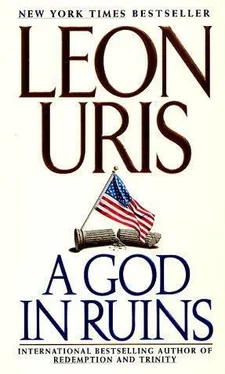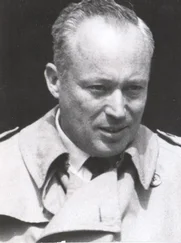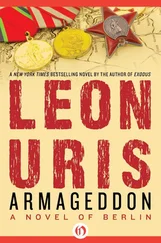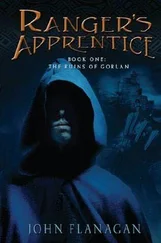“What was Rita,” Quinn said, “sixteen or seventeen when I left?”
“She’s not seventeen anymore, Quinn? When you hooked up with Greer, Rita grieved as only a teenager could.”
“Oh, come on, Mal. I never gave her an improper look.”
“Yes,” Mal said, “and I felt very good about that. Even a roustabout artist can have lionesque protective instincts about his only daughter. Rita was always a holy light to me. She tried to model for me a couple of times, but she was too beautiful to ruin in stone or oil.”
“Why are you suddenly telling me this?” Quinn asked.
“She made a loud noise by her absence.”
“I missed her, too,” Quinn said. “I’ve loved Rita all my life but never thought of her as more than a little sister.”
“Exactly the point,” Mal retorted. “Rita is terrified that you’ll reject her as a woman.”
Quinn wanted to argue, but Mal’s pronouncement had too much sting to it, too many years of wisdom.
“Do you want to see the Quinn O’Connell shrine in her room?” Mal led him by the arm and opened her door. The walls were adorned with photographs of Quinn the ball player, Quinn the rodeo rider, Quinn the Marine. There was a torn football jersey hanging off a rafter, a scrapbook.
“How do you feel about this, Mal?”
“You can’t tell a person to change the longings of her heart. But now, well, you are back to stay, and I believe Rita wants to come back to stay and to write. I would like to see this part of her life resolved. In the drawers there are short stories and poems. Rita trying to prove to you and me that she is worthy of our love. That’s why little girls twist themselves in pretzels in ballet class, to win their father’s approval. That’s why big girls write erotic poetry, to win their lover.”
“And me, Quinn Patrick O’Connell?”
“Don’t you know how much I love you, amigo?” Mal said. “It has been no pleasure knowing her secret and having to remain silent all these years. Will you stand up and tell her now?”
Mal’s words chilled him. He was frightened. “Suppose I don’t.. . can’t love her that way?” Quinn asked.
“You’d have to be crazy not to love Rita, but it’s your heart, man, just tell her the truth.”
Quinn stared at her photographs and blended them with his own memories of a quiet little sloe-eyed, raven silk-haired being, tickled by him but hardly laughing to show him the stuff she was made of. Even in her early teens she had been scrumptious, classically round, voluptuous in a bikini.
“I’ve done something dreadful,” Mal said. “I knew she kept a drawer of secret poetry, and I went in without permission.” He opened the drawer and handed Quinn a paper. “She wrote this when she was sixteen.”
Our first night together after dark you never caught me following at reaching distance behind you on your way home from the river.
Had you looked back you would have seen the same child whose spare, uncharted body you would instinctively shield with yours against the sudden loss of passing time.
Twice you paused,
as if between movements of a symphony the secret panicked crackling leaves under my feet and artless rhythm in the audience of your forest.
An aspen tree marks the place where your land begins.
Its infinite shadows like fingerprints of the moments I have stood
beside it confusing your arms with its firm extended branches,
the deep cedar color of your skin,
the bark white corners of your eyes,
the sap which in unnatural light fills them,
runs down the ordinary roughness of wood,
your unshaven cheek. For the first time, this night,
I stayed longer to watch you walk toward the lit windows of your cabin saw your two halves split at the roots:
wood and flesh bark and skin the veins of dried leaves the greener veins across your wrists.
You never knew but we fell asleep together half of you beside me,
the other half locked behind a lit window,
all silent until the dark noisy grass woke us,
rousing itself with thoughts of its own fallen dew.
“God,” Quinn whispered. “Her stories? Have you ever read them, Mal?”
“She read to me once in a while, or used to. I never wanted to be in judgment of her. Suppose she has no talent. I don’t want to be the one to reject my daughter. Quinn, I’ve seen enough of her writing to know she isn’t going to make it. I’ll be there to pick her up when the realization comes to her. I’m a mediocre artist. I get through by being a Mexican tit man. I fart around with this modern bullshit because nobody, critics or clients, knows what it is but wouldn’t dare say so. You can’t get away with my shit as a writer.”
“Mal, no sale. You’re great.”
“He’s great,” Mal said, pointing at an original scribble by Van Gogh.
That night Quinn’s letters from Rita came out of his sea trunk. There were well over a hundred of them. Seen from letter to letter, their continuity was soon understood. Not exactly veiled words of love, but more of missing him as a part of the mountains. Nothing about boyfriends or her own growing maturity. She let the photographs do the talking.
Quinn had gotten one of two monkeys off his back. The resurrection with his parents was a great blessing. The other? Greer Little. He clung to a diminished, unreal thread. Hadn’t Rita done the same thing? The women who loved Marine gunners were plentiful, but .. .
Quinn was puzzled by his own soul opening up. He didn’t know if he loved her and wouldn’t know until they stood face to face.
Quinn quivered every time he thought of Rita. All the way to the upstate New York Writers Conference, he sighed constantly.
A powerful uncertainty it was whose moment of truth had come.
In the splendiferous woods bordering Lake George, the great old novelist Christopher Christopher held forth for ten weeks in the summer for serious aspiring writers. Ten weeks to feed the dream.
One had to go back a bit to remember Christopher’s last great novel. He had outlived his mediocre talent but knew the whens and hows. He became a legend.
Actually, did old Christopher have any masterpieces? His name wove in and out of a generation of magnificent American writers, from the ex patriots in Paris between world wars or in Pamplona, where he chased the bulls with Hemingway. Hadn’t he actually been a cub reporter who got an interview with Hemingway and after Papa’s death became a Hemingway “close friend” and aficionado. He wrote of visits to Cuba to arm wrestle Papa. Never happened.
What about Sinclair Lewis? Christopher Christopher’s New Yorker portrait of “Red” was certainly quintessential. Of course, not that many things had been written about Sinclair Lewis.
Christopher Christopher really made his big hit in American literature with an article for Esquire entitled “Chrysler Airflow—The Great American Car.”
A Broadway producer of zingy revues thought it had a catchy ring to it—The Great American Car. He named one of his annual follies after it, and eight hundred performances later, Christopher Christopher was made for life.
These days he was an American icon (who once had tossed a chilled martini into F. Scott Fitzgerald’s face). Now thatched with wild silver hair, he held forth at Lake George with a dozen “master” students conducting the eternal hunt for the great American novel.
Читать дальше












